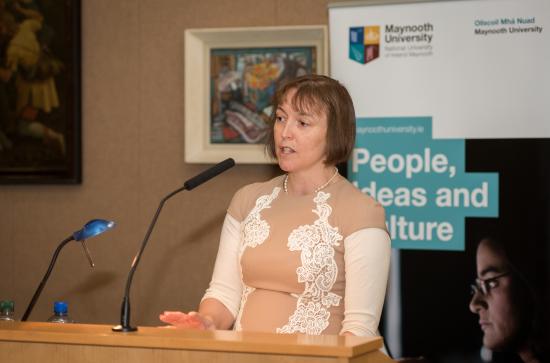
Sharon Donnery, Deputy Governor, Central Bank of Ireland, has today argued that the case in favour of setting a positive Countercyclical Capital Buffer (CCyB) sufficiently early in the economic cycle, to build in resilience and mitigate pro-cyclicality in a downturn, is compelling. The Deputy Governor was speaking at Maynooth University where she lectured in economics before joining the Central Bank of Ireland.
Deputy Governor Donnery began her remarks by assessing the current state of the Irish economy: “The Irish economy and financial system have been through a remarkable decade. Following the onset of the financial crisis, and the painful adjustment that households, businesses, and the public finances went through at that time, the cycle has now firmly turned,” she said.
Deputy Governor Donnery noted that employment, household incomes, consumption, investment and government finances had all improved, demonstrating strong cyclical dynamics in the economy. These dynamics are expected to be increasingly reflected in wage growth and have already been evident in asset prices and, in particular, the growth in house prices in recent years. “At this stage of the economic and financial cycle, however, we are now facing additional challenges – how to maintain sustainable and balanced growth when the economy hits capacity constraints,” the Deputy Governor said.
Turning to the outlook for the economy, Deputy Governor Donnery noted that the relatively low unemployment rate, the continuing rise in real estate prices and the recent turn in the credit cycle are indicative of potential emerging cyclical risks. The Deputy Governor also highlighted the vulnerabilities that remain from the last crisis, such as high levels of household debt and non-performing loans, as well as noting that the external environment that has underpinned recent growth in the Irish economy is outside of our control.
The Deputy Governor argued that it is therefore timely to consider the wider aspects of the Central Bank’s macroprudential policy toolkit in order to promote resilience in the financial system. She said: “Building resilience means using the gains from strong positive cyclical dynamics to build up sufficient buffers to withstand the losses that will arise during a downturn. These buffers can then be released when necessary. Resilience can also complement efforts of policy to dampen, or at least not to amplify, the cycle.”
Explaining the role of the CCyB, Deputy Governor Donnery said that it is designed to ensure the banking sector overall holds sufficient capital to help it maintain the flow of credit to the economy during periods of financial stress. This buffer works by increasing the minimum capital requirement of banks when cyclical risks begin to build. In this way, banks should have a greater level of capital to absorb losses that may arise in any subsequent downturn or period of financial stress. During such a period the buffer can then be released, reducing minimum capital requirements in a sustainable way from a system-wide perspective. As a result, the potential dampening impact of capital requirements on bank lending is reduced during a downturn, which could otherwise restrict the flow of credit, further depressing economic activity in a pro-cyclical manner.
Deputy Governor Donnery ended her speech by stating the reasons in favour of an early activation of the CCyB in Ireland, including:
- The likely minimal impact on credit growth and economic activity
- Lags in implementation for banks and lags in data relevant to decision making
- The growth in lending not directly regulated by Central Bank’s mortgage measures, including loans to SMEs, corporates and commercial real estate activity, which accounts for approximately 30% of Irish banks’ outstanding loans
- Ireland’s intrinsic economic volatility as a small, open economy and the scale of legacy debts which increases vulnerability to future cyclical reversals.
“Given these relevant features, and what we know about the short-to-medium term outlook for the Irish macro-financial environment – or perhaps more importantly what we are unsure of – a more active use of the CCyB in Ireland should be considered,” the Deputy Governor concluded.
Read the full speech: “When is the right time? Macroprudential policy and the cycle?”
